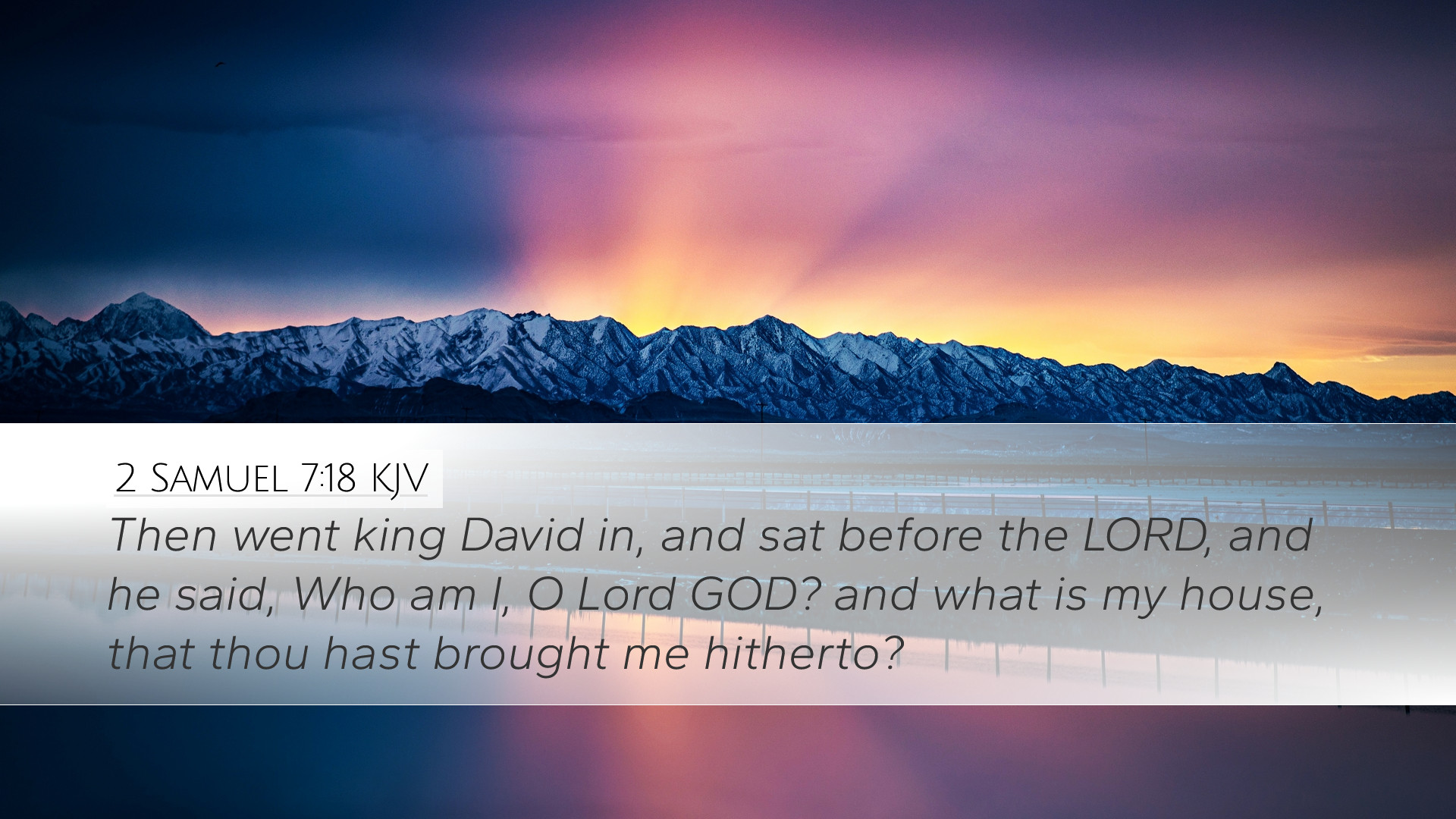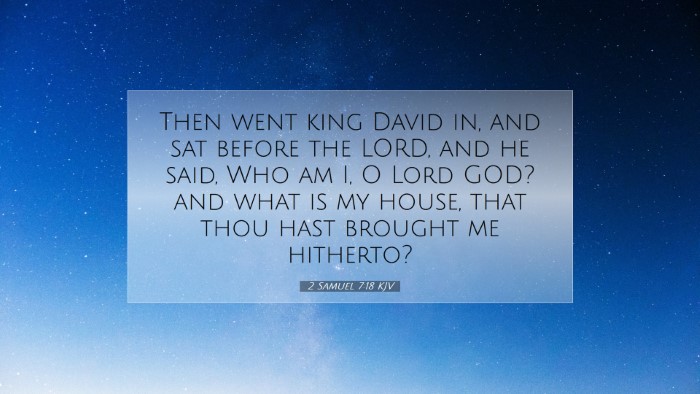Commentary on 2 Samuel 7:18
2 Samuel 7:18 states: "Then went King David in, and sat before the Lord: and he said, Who am I, O Lord God? and what is my house, that thou hast brought me hitherto?" This verse marks a pivotal moment in the biblical narrative, encapsulating themes of humility, divine favor, and the significance of covenantal relationship. In this commentary, we explore insights from public domain commentaries by Matthew Henry, Albert Barnes, and Adam Clarke, providing an in-depth analysis tailored for pastors, students, theologians, and Bible scholars.
Contextual Background
David's inquiry to God comes after receiving God's promise of an everlasting dynasty. This promise occurs within the framework of the Davidic Covenant, a significant theological theme that extends throughout the Old and New Testaments. David's reaction, recorded here, reflects a deep reverence for God’s sovereignty and grace.
Insights from Matthew Henry
Matthew Henry emphasizes David's posture of humility and gratitude. He notes that David acknowledges, “Who am I?” as a recognition of his own unworthiness. David's question reveals the descendant line of Judah’s unexpected exaltation, and it serves as a model of how believers ought to approach God with readiness to receive His grace.
- Humility: Henry highlights that David’s humility is foundational for understanding the grace of God. In recognizing his own limitations and former life as a shepherd, David expresses the core principle that God's choices are arbitrary and rooted in divine wisdom rather than human merit.
- Personal Reflection: This passage invites readers to reflect on their spiritual journey and their standing before God, reinforcing that God’s choice to bless is purely based on His loving kindness and not human achievements.
Insights from Albert Barnes
Albert Barnes focuses on the theological implications of David's question regarding his lineage and God’s grace. He notes that David's inquiry illustrates the mystery of divine providence and election.
- Divine Election: Barnes articulates that David's awareness of his meager beginnings underscores a fundamental biblical truth: God often selects unlikely individuals for His plans, thus demonstrating His ultimate control and providence over history.
- Covenantal Faithfulness: Barnes draws attention to the concept of the covenant, emphasizing how God's promise to David is not only about the future of a dynasty but also about the unfolding narrative of redemption that will culminate in Christ.
Insights from Adam Clarke
Adam Clarke provides a pastoral perspective on David's interaction with God. He underscores the emotional and spiritual state of David, highlighting both the joy and the weight of the responsibility that comes with God’s promises.
- Emotional Weight: Clarke points out that David's heartfelt lament underscores a profound moment of self-reflection. The king realizes the gravity of God's dealings with him not merely as a king but as a man after God’s own heart.
- Understanding God's Grace: Clarke emphasizes that this moment should evoke a sense of awe among believers towards the unmerited grace of God, acknowledging that God’s purposes often transcend human understanding.
Theological Themes
Several overarching theological themes emerge from 2 Samuel 7:18, which can inform the teaching and preaching done by pastors and guardians of theology:
- The Nature of God: This verses exposes God as sovereign and gracious, able to elevate individuals beyond their natural state and circumstances.
- Human Response: Reflecting on David’s inquiry, believers today are encouraged to approach God with humility, fostering a deeper relationship grounded in trust and gratitude.
- Continuity of Revelation: David’s understanding of his role in God’s plan prefigures the ultimate revelation of Christ, reiterating the coherence of biblical narrative.
Application for Ministry
In practical application, 2 Samuel 7:18 challenges leaders and believers within the church community to:
- Practice Humility: Encouraging individuals to understand their role in God’s plan with humility fosters a spirit of unity and service.
- Celebrate God’s Faithfulness: Ministries should reflect on God’s promises and past faithfulness as a motivation for present and future faithfulness.
- Encourage Personal Reflection: Creating spaces for personal reflection can deepen the congregational understanding of their personal call from God, much like David's encounter.
Conclusion
In conclusion, 2 Samuel 7:18 is a poignant reminder of the profound relationship between God and humanity, marked by grace, humility, and faithfulness. Through the insights gleaned from church fathers and commentators, a richer understanding emerges, highlighting the continuity of God’s work through history and inviting believers into deeper communion with Him.


